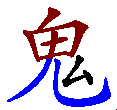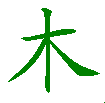Chinese Characters and Early Genesis
Is there any evidence that Chinese people ever knew about the early accounts in the Book of Genesis, such as a devil in the Garden of Eden, the great flood, or the Tower of Babel?
Yes, as some evidence seems to exist in early Chinese writings.
Notice for example that an ancient Chinese character for Devil indicates a knowledge of the account in Genesis:
 |
 |
 |
 |
Sadly, Eve seemed to believe the devil as she desired to benefit from the fruit of the tree that was prohibited:
So when the woman saw that the tree was good for food, that it was pleasant to the eyes, and a tree desirable to make one wise, she took of its fruit and ate (Genesis 3:6).
God decided later to prohibit the second tree lest Eve and others desired it so much that they would go for it as well (see Genesis 3:22-24).
Notice the symbol for the Chinese word lán for desire or greed is a combination of the symbols for woman and two trees:
 |
 |
 |
Greed |
+ Trees |
After succumbing to temptation, humans noticed that they were naked:
Then the eyes of both of them were opened, and they knew that they were naked; and they sewed fig leaves together and made themselves coverings. (Genesis 3:7).
Notice that the Chinese symbol for being naked has to do with clothing, one tree (the one that Adam and Eve were originally told not to eat from perhaps), and a garden with four irrigation canals:
|
|
 |
 |
 |
| + Garden |
After Adam and Eve were expelled from the garden they had children. On of their sons was Abel, who raised and sacrificed sheep:
Now Abel was a keeper of sheep…Abel also brought of the firstborn of his flock and of their fat. And the LORD respected Abel and his offering (Genesis 4:2,4).
Notice what a Chinese character meaning righteous is made of:
 |
 |
 |
 |
| + Hand | + Lance |
Interestingly, the New Testament account of Abel refers to:
…the blood of righteous Abel (Matthew 23:35).
Notice how the Chinese symbol agrees with the New Testament account that essentially the sacrifice of sheep (by Abel, for example) was righteous.
Since Christ was our Passover lamb sacrificed us, and that through Him we attain righteousness at least one has speculated that perhaps that is why the following symbol for righteousness was somehow chosen (since the combination of the symbol for hand and lance can mean us):
 |
 |
 |
| Righteous(ness) |
And while it is NOT likely that this was determined by the Chinese after Jesus’ crucifixion, it is a fact that Abel and Noah, who the Bible calls righteous, sacrificed clean animals such as sheep.
Many know that Chinese history contains an account of some type of worldwide flood. And there may be a couple of aspects of it preserved in its characters.
Notice a couple of statements in the Bible concerning the flood:
Then the LORD said to Noah, “Come into the ark, you and all your household, because I have seen that you are righteous before Me in this generation. (Genesis 7:1).
…in the days of Noah, while the ark was being prepared, in which a few, that is, eight souls, were saved through water (1 Peter 3:20).
A Chinese word chuán for a type of boat is:
 |
 |
 |
 |
| = 8 | + Little Boat, Vessel |
It may be of interest to note that one of the Chinese symbols for flood (chong) is a combination of an inverted symbol meaning “first Earthly branch” and eight (the term for eight may instead mean “person remaining””–that of itself is interesting as that the symbol for eight and “person remaining” look about the same–recall that on the ark there were only eight persons remaining alive).
After the flood, humans stayed together and built a tower:
Now the whole earth had one language and one speech. And it came to pass, as they journeyed from the east, that they found a plain in the land of Shinar, and they dwelt there. Then they said to one another, “Come, let us make bricks and bake them thoroughly.” They had brick for stone, and they had asphalt for mortar. And they said, “Come, let us build ourselves a city, and a tower whose top is in the heavens; let us make a name for ourselves, lest we be scattered abroad over the face of the whole earth.” (Genesis 11:1-4).
But God did not care for this:
But the LORD came down to see the city and the tower which the sons of men had built. And the LORD said, “Indeed the people are one and they all have one language, and this is what they begin to do; now nothing that they propose to do will be withheld from them. Come, let Us go down and there confuse their language, that they may not understand one another’s speech.” (Genesis 11:5-7).
It is highly likely that when people saw others speaking foreign languages, that they thought that somehow something at this tower affected their mouths. Notice the following Chinese symbol of a tower.
 |
 |
 |
 |
 |
|
| = Grass | + Clay | + Mankind | + Mouth |
The tower of Babel was built with bricks (grass and clay) and humans originally had one language (or mouth). It is possible that this symbol is showing that the ancient Chinese recognized a connection to the biblical tower of Babel.
The Bible shows that after God confused the languages in Babel that He scattered humans all over:
So the LORD scattered them abroad from there over the face of all the earth, and they ceased building the city. Therefore its name is called Babel, because there the LORD confused the language of all the earth; and from there the LORD scattered them abroad over the face of all the earth (Genesis 11:8-9).
The Bible also mentions:
To Eber were born two sons: the name of one was Peleg, for in his days the earth was divided; and his brother’s name was Joktan (Genesis 10:25).
Now whether it was just the scattering of humans that occurred in Peleg’s time, or that the earth had continental divisions at that time is not completely clear. What is clear, however, is that humans did separate essentially by language and ethnicity thousands of years ago.
Chinese characters apparently predate Moses:
…the ancient Chinese people were quite familiar with the same record which the Hebrew Moses is popularly given credit for writing some 700 to 1,000 years later. Imagine this information being stored in special characters that were in use hundreds of years before the first page of the Bible was written! (Kang C.H., Nelson E.R. The Discovery of Genesis: How the Truths of Genesis Were Found Hidden in the Chinese Language. Concordia Publishing House, St. Louis, 1979, p. 5)
Notice that the development of Chinese characters predates the writing of the Book of Genesis. Thus, the Chinese characters seem to provide an ‘independent’ account that verifies portions of the accounts in Genesis.
Continuing, the authors of the previous citation go so far as to state:
Moreover we believe that the Chinese actually employed this historical knowledge as one small facet in the process of building their written language. The significance of this claim is broad. But most important, it appears to us to give support and added acceptance of the much slandered account of Biblical Genesis (Ibid).
Thus, the existence of these Chinese characters should be a comfort to the Chinese that their ancestors did have some type of biblical witness. These characters should also help modern believers understand that even in a land as removed as it is from the Middle East, the Chinese did know about various portions of the Genesis account. And since their characters were developed prior to Moses writing Genesis, their very existence provides additional verification that the events were known for many thousands of years.
The above information and more is included in the article China, Its Biblical Past and Future, Part 1: Genesis and Chinese Characters .
Other articles of possibly related interest may include:
China, Its Biblical Past and Future, Part 2: The Sabbath and Some of God’s Witness in China When did Christianity first come to China? And is there early evidence that they observed the seventh day sabbath?
China, Its Biblical Past and Future, Part 3: China in Prophecy What is Ahead for China? What will happen to nearly all the Chinese?
 |
Tweet |
|
